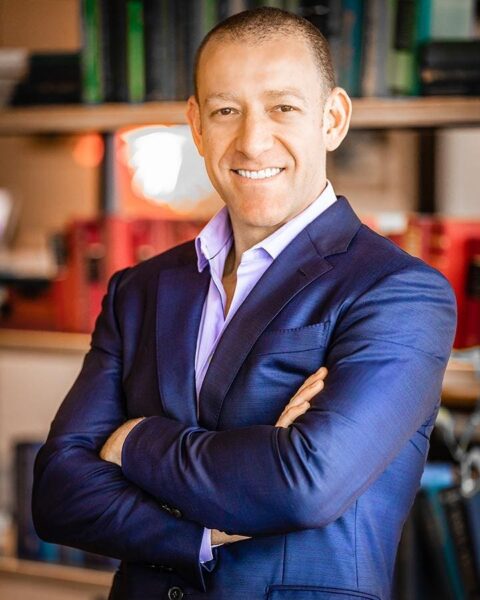AI Leaders Share How Business Owners Can Leverage AI As A Growth Engine That Expands Their Reach Without Expanding Their Teams
Dr. Michael “House” Housman, AI-ccelerator Founder and CEO, in his office, February 2023, Austin, TX
Travis Lilley
How AI Lets StartUps Unlock Growth Quickly And Efficiently
Dr. Michael “House” Housman has been building AI platforms for 15 years for companies, from high-growth startups to the Fortune 500, at AI-ccelerator, where he is founder and CEO. He told me that AI levels the playing field; solo founders can now execute like a full department. His advice to startups and small businesses: “Start small: Automate one repetitive task that steals your time each week, whether it’s drafting emails, generating marketing assets, or analyzing customer feedback. Once you see the ROI, expand.”
He explained that the key is “to think of AI not just as a tool, but as a collaborator that can handle the heavy lifting while you focus on vision, relationships and innovation. The entrepreneurs who adopt that mindset will move dramatically faster than those waiting on the sidelines.”
Housman told me he doesn’t just advise companies to use AI; he uses it himself. “I use AI as a force multiplier across every part of my business, from automating research and content creation to building custom AI agents that handle client onboarding, data analysis and workshop preparation. It lets me operate with the efficiency of a much larger team so I can focus on strategy, creativity and delivering value directly to clients.”
Small businesses can use AI like Housman does at AI-ccelerator because the result is a business that grows faster without adding operational overhead: “AI helps me personalize engagements at scale by rapidly tailoring insights, examples and training content to each organization I work with, something that would be impossible to do manually.”
His book Future Proof: Transform Your Business With AI (or Get Left Behind) is being released in January, with case studies, practical frameworks and guidance for implementing AI across marketing, operations, sales and product development. Housman said, “It shows how AI is reshaping every industry and how to adopt it before competitors do. The goal is simple: Empower leaders to harness this technology confidently rather than fear it.”
How AI Is Transforming Writing And Publishing
MeiMei Fox, Founder and CEO of Your Bestselling Book, Honolulu, HI, December 2023
Wendy K. Yalom
MeiMei Fox, Founder and CEO of Your Bestselling Book, is an an author and entrepreneur with a small book coaching, ghostwriting and hybrid publishing business, working with aspiring authors to help them get their books written and published. She told me she’s been using AI to streamline emails, finances and design, as well as to edit and structure book content.
She explained, “For my clients, especially authors and creatives, AI has been a game changer. Many have used it to turn their books into audiobooks, translate content for international markets, and create social media assets by opening new revenue streams and expanding reach. For those who have struggled with the technical or marketing side of publishing, AI has made it easier to launch and promote their work independently.”
Fox said that Google’s NotebookLM is the biggest breakthrough in writing since the word processor. “You upload any documents you want, from your own writing, to podcasts, to Youtube videos, to PDFs, and it creates a library of your content. You can then chat with the Notebook as you would with any LLM, except it only derives answers from the sources you uploaded. And it footnotes the reponses, showing you exactly where it found the answer in your source materials. Basically, it’s like having a brilliant research assistant who knows everything you’ve ever written. It cuts the time it takes me to ghostwrite a book from a year to about three months.”
On the other hand, she also said she hates “all the AI slop I’m seeing everywhere on the internet. Friends who used to write beautiful email newsletters and thoughtful LinkedIn posts are now clearly relying on ChatGPT and it all sounds the same.” She believes there will always be a role for skilled experts like her who can tell them, “You need a story here. Add more emotion. Connect these three ideas more clearly.”
How Visual AI Is Becoming a Competitive Advantage
Drue Kataoka during her keynote at the Annual Meeting of the World Economic Forum, in the Congress Center where she had a solo art exhibition, moderated by Cristiana Falcone (seated), Davos, Switzerland
Drue Kataoka Studios
Drue Kataoka Art Studios has been a pioneer in various emerging technologies in the visual and creative space. The CEO, artist Drue Kataoka, frequently speaks on how business and government leaders can harness the visual revolution powered by AI. She told me that most organizations obsess over text-based tools and tend to overlook the visual. “That blind spot creates an enormous advantage for the leaders who move early. The most powerful visual tools can have a steeper learning curve: Sometimes you need to download and run models locally rather than rely only on polished, tightly controlled apps from the frontier labs. But when you do, the creative and strategic payoff can be exponentially greater.”
Kataoka explained that AI gives you the opportunity to create high-quality assets at unprecedented speed. “It’s like having several movie studios in your pocket. The catch is, you need to hone your artistic and directorial skills and build what I call ‘The Vision Muscle.’” Her advice to business owners is to start now, by trying 20 to 50 tools in the next two weeks. Her recommendations: “Google’s Nano Banana (advanced image-editing with character consistency), Pomelli (a tool for exploring your business DNA), Mixboard (an experimental, AI-powered concepting board), Imagen on Vertex AI (an enterprise-grade platform for generating and editing studio-quality images at scale), Google AI Studio (a free tool for developers and creators to prototype with Google’s latest generative AI models), Veo (Google’s most advanced text-to-video generation model), Midjourney (a premier AI image generator), and Descript (a video and audio editor that works like a word doc).” She told me that the sooner you start experimenting, the sooner you start shaping the visual future of your business instead of reacting to it.
Generative Engine Optimization: The New Way to Get Online Visibility
Svetlozar Kazanjiev, on a boat from Svalbard, where he spoke at the FutureTalks conference, at the North Pole
Eleg.AI
Svetlozar Kazanjiev is the Managing Partner of Eleg.AI, a growth marketing consultant focusing on Generative Engine Optimization for brands in B2B, e-commerce and services. He told me that over the last two years, Google quietly erased 20% to 40% of website traffic, and most companies still haven’t noticed who took it. “Search, especially Google search, used to be the lifeblood of the internet. That era is ending. Customers are no longer typing questions into a search box; they’re asking AI, and trusting whatever answer comes back. My team helps companies, from fast-growing startups to large enterprises, figure out how to show up when that happens.”
Kazanjiev (who happens to be Kataoka’s husband) explained that his expertise is Generative Engine Optimization, or GEO, the discipline of understanding which brands, pages and products AI tools choose to cite. This means they have to understand complex algorithms. This is his recommendation for entrepreneurs:
“Treat GEO as a serious, ongoing discipline, not a side project, because the quality of your presence in AI will largely determine your overall business success. A simple way to start:
- Map the 20 to 30 most important questions your best customers ask before they buy.
- See what the main AI tools currently say and who they cite when you ask those questions.
- Create or upgrade pages on your site that answer those questions clearly and in depth (3,000 plus words). Make it easy for AI to ‘understand’ and quote you. Use clear headings, Q&A sections, and show real expertise.”
Doing this, he has seen companies that were buried as far back as page four of Google suddenly become the brand AI answers keep mentioning, because their content is the most useful and best structured. His conclusion: “You don’t have to win every AI prompt; you just have to win the questions that matter most in creating your revenue.”
The Small Businesses That Win Will Use AI
AI won’t replace entrepreneurs, but it will change how much they can achieve, and how fast they can do it. The winners will be the small businesses that start now and use AI to unlock the growth that once would have required much larger organizations.









